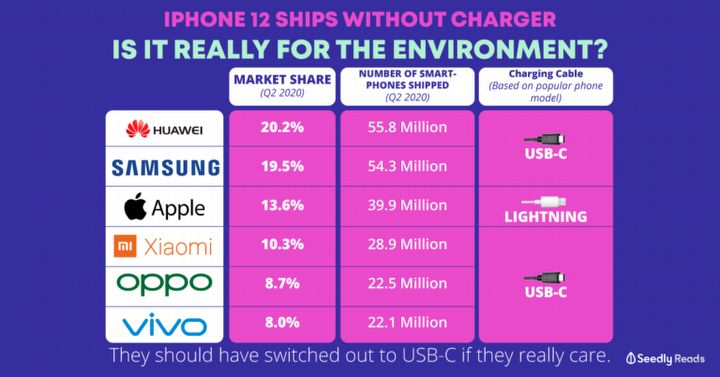EU Could Force Apple to Use USB-C on iPhones From 2024 [UPDATED]
The European Union may soon force Apple to introduce USB-C in iPhones. Draft regulations for a standarized charger will be unveiled tomorrow.
![EU Could Force Apple to Use USB-C on iPhones From 2024 [UPDATED].](https://cdn.gracza.pl/i_gp/h/22/370009398.jpg)
UPDATE
As planned, on September 23 the European Commission presented a project on the unification of connectors used for charging a large part of electronic devcies. The text of the proposal of the new legislation reads that the European Union intends to fight against electronic waste and to simplify the lives of people buying smartphones, tablets, etc. From the moment the directive comes into force all smartphones, tablets, cameras, headphones and portable speakers and video game consoles are to have a USB-C connector. This means that if Apple still wants to sell its hardware in the EU (and it probably does), future iPhones will have to have a USB Type-C port. But that probably won't happen until 2024 at the earliest, as companies will have 24 months to comply with the new rules (which should come into effect in early 2022).
What's more, the European Union wants customers to be able to buy any electronic device without a charger. The idea is that people who have enough chargers won't be forced to collect more unnecessary accessories. The European Commission also plans to force manufacturers of electronics (especially smartphones) to standardize fast charging. The EU wants to "prevent different manufacturers from unduly limiting charging speeds by different manufacturers and ensure the same charging speed with any compatible charger".
![EU Could Force Apple to Use USB-C on iPhones From 2024 [UPDATED] - picture #1](https://cdn.gracza.pl/gallery/html/news/694312312.png)
Original message
The idea of introducing legislation to standarize phone chargers appeared back in 2014, and in early 2020, MEPs voted a resolution calling on the European Commission to prepare appropriate legislation. We wrote about it here. On 23 September, the EC is to present draft legislation on the matter.
If the legislation comes into force, Apple will be forced to use the USB-C connector in phones sold in the European Union. The latest iPhones(check current iPhone 13 prices on Allegro) are still equipped with a Lightning connector, and the company has consistently opposed the idea of a common charger, claiming that such a solution will hinder the development of technology and increase electronic waste. Critics accuse Apple of being solely profit-driven in this matter, wanting to maintain sales of Lightning-based accessories. Interestingly, iPads only use a USB-C connector. Apple remains the only manufacturer whose phones do not have a USB port. For comparison, the table below shows how many smartphones with USB-C and Lightning connectors were sold in Q2 2020:
The European Commission's proposed legislation is expected to cover not only smartphones, but also tablets, headphones, speakers, cameras and camcorders. The new law will not include e-readers and wireless chargers. Additionally, manufacturers will be required to create a compatible fast charging protocol. At the moment there are several solutions, of which only the systems used by Samsung and Motorola are compatible with each other (they are based on Qualcomm's Quick Charge technology). In addition, the European Commission wants manufacturers to sell electronic devices without chargers included, which is already a practice used by Apple, Samsung and Xiaomi. This is expected to save a lot of raw materials and reduce electronic waste by more than 980 tons per year.
The European Commission plans to adopt the new law in 2022. Member countries will be given a year to change the rules, and manufacturers will have an additional year to adapt to new regulations. In the middle of 2024 the regulations standarizing the chargers should be in force throughout the European Union.
DISCLAIMER
GamePressure receives a commission from selected shops whose offers are presented above. However, we have made every effort to select only interesting promotions - above all, we want to publish the best offers on equipment, gadgets and games.
0
Latest News
- End of remote work and 60 hours a week. Demo of Naughty Dog's new game was born amid a crunch atmosphere
- She's the new Lara Croft, but she still lives in fear. Trauma after Perfect Dark changed the actress' approach to the industry
- „A lot has become lost in translation.” Swen Vincke suggests that the scandal surrounding Divinity is a big misunderstanding
- Stuck in development limbo for years, ARK 2 is now planned for 2028
- Few people know about it, but it's an RPG mixing Dark Souls and NieR that has received excellent reviews on Steam, and its first DLC will be released soon


